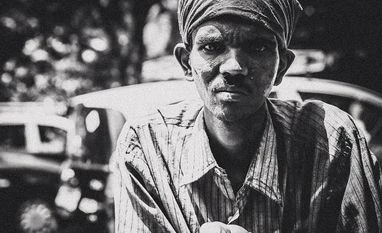Around my home and on my way to work and back, every day I come across some people who I no longer register. Let me begin by introducing them.
In the morning, when taking my dog for a walk, I see a boy of about 14 who walks around lethargically with a bulky, dirty bag on his shoulder. In it he collects discarded bottles, pieces of metal, polythene bags and other stuff of value. I have seen him for a few years now, always with a handkerchief that he keeps sniffing at. It is smeared with some kind of cheap drug, possibly a whitener.
Driving to work on Delhi’s Oberoi flyover, named after the five-star hotel it runs past, I catch a fleeting glimpse of a madman. He is usually perched on the road divider. On some days, he seems happy, waving at the traffic zipping past him. On others, he is angry and shouting at the world.
At the traffic light next, a tall, one-legged man hops from vehicle to vehicle begging for alms. He is not there when I am returning from work. By then it’s usually dark and probably unsafe for him to be hopping on one leg on the busy road. Instead, I encounter two other people. One of them has a pleasant, round face. He cannot walk, so he sits on the footpath. People sometimes get off their cars, bikes or auto-rickshaws to give him money. The other is a thin, short man who is missing a hand. His left arm ends in a stub on which he sometimes carries strings of sweet-smelling jasmine blossoms or a bagful of wafers to sell. Some days he just begs.
One warm evening, I saw him standing among the vehicles shouting into the air: “Sab sheeshe band hain. Sabka music on hai. Meri aawaz kaun sun raha hai! Phoolon ke liye kiske paas time hai! (All the windows are rolled up. Everyone’s music is playing. Who is listening to my voice! Who has time for flowers!)” I felt sorry for him and his situation, but that’s it.
Apart from these fixtures, there are the little children who sell roses and ballpoint pens at traffic lights. I usually look the other way when they approach my car. Or start fiddling with the music system, pretending that I have not registered their presence. Sometimes I just shake my head in a dismissive “no”. And I feel relieved when they move away.
All these people belong to a world I encounter at close quarters every day. A world I chose not to acknowledge till something happened last week that forced me to.
I was in Connaught Place, outside a showroom of a multinational clothing retail company, when I heard a guard shouting. He was shooing away and shoving two teenage boys. Both were beggars who had stopped at the large glass door of the showroom to look inside. Their squalor presented a startling contrast to the luxuriousness on the other side. In the corridors that run around the Georgian-style buildings were dozens of others like them, some sprawled listlessly on the floor.
If there is one segment of society that is truly our blind spot, it is this. According to Census 2011, India has 413,670 beggars and vagrants. Many of them are homeless and, therefore, fall outside of the government’s welfare umbrella.
Last year, while hearing a petition regarding shelters for homeless people, the Supreme Court raised concerns over them not getting the benefits of social welfare schemes, which are now compulsorily linked to the Aadhaar card. How can they get an Aadhaar card when they don’t have a permanent address, the court asked. It means that they are non-existent for the governments, the court said.
To receive the benefits, beside the Aadhaar card, they also need to have a bank account. How many of them have it? And, how many of them have voter identity cards? Did they vote in the mammoth election that just ended? Before every election, we are reminded that every vote counts. Does theirs, for governments present and past?
Three weeks from now, the new government will present its first Budget. Will the street-dwellers who live by begging be in its economic sight? I hope so. Because in the absence of institutionalised measures, there is little that can pull them out of the hopelessness of their existence.
Unlock 30+ premium stories daily hand-picked by our editors, across devices on browser and app.
Pick your 5 favourite companies, get a daily email with all news updates on them.
Full access to our intuitive epaper - clip, save, share articles from any device; newspaper archives from 2006.
Preferential invites to Business Standard events.
Curated newsletters on markets, personal finance, policy & politics, start-ups, technology, and more.
)